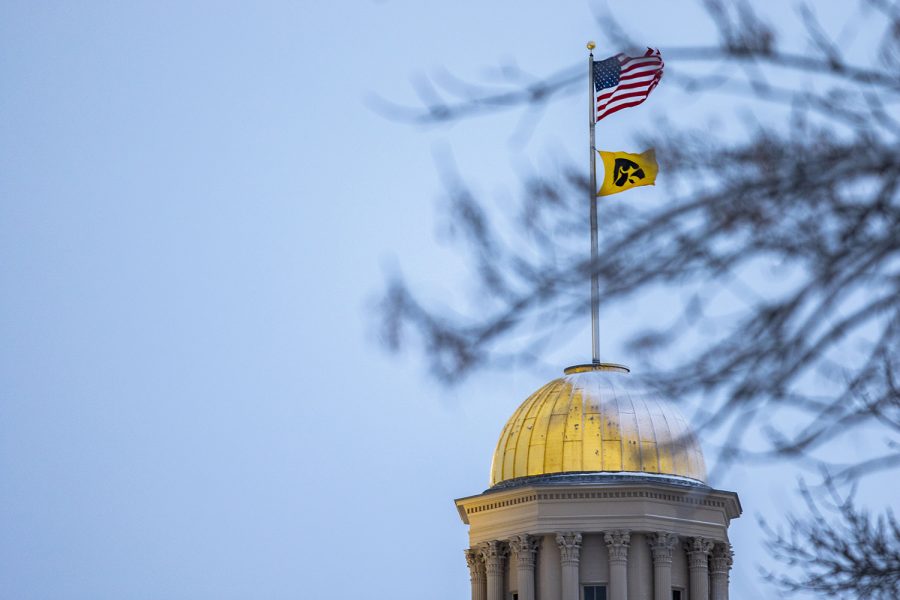Diversity Catalyst Award given to faculty, staff, students
Upon its 20th anniversary, the Diversity Catalyst Award was recently given to five individuals and two programs, and a brand-new Diversity, Equity and Inclusion Legacy Award was created.
The Old Capitol is seen on Nov. 25, 2018.
March 14, 2019
This year marks the creation of a new Diversity, Equity, and Inclusion Legacy Award as the University of Iowa celebrates the 20th anniversary of the Diversity Catalyst Awards.
Four faculty and staff members, one student, and two programs received the award this year.
RELATED: Diversity, equity, and inclusion listening sessions planned to enhance campus climate
Established in 1999 by what was then the Office of Affirmative Action, the Diversity Catalyst Award aims to honor individuals and groups at the UI who promote diversity across campus.
Charter Committee on Diversity co-chair Sarah Bruch said she is honored to have been nominated and selected as its winner.
“We continue to strive toward having a greater diversity in all of our campus constituencies,” she said. “And I think that even though the university has goals in that regard and has done a lot to increase the diversity of different stakeholders on campus, there’s still a long way to go.”
Bruch said a common goal of many UI faculty, staff, and students is a paradigm shift in the institution’s strategic plan for a focus on diversity to diversity, equity, and inclusion. The latter opens up questions about whether different student groups feel respected on campus.
“Diversity, equity, and inclusion really comes in when you start to talk about people on campus,” she said. “Regardless of the amount of diversity, that doesn’t necessarily lead to greater equity and inclusion.”
RELATED: Shivers: UI focused on supporting underrepresented populations
Bruch was heavily involved in an assessment of campus climate in different groups at the institution to inform how a diversity, equity, and inclusion strategic plan at the UI could promote diversity across different disciplines.
“That’s something you have to be very intentional about,” Bruch said. “Diversity, equity, and inclusion is everybody’s work. We need to make everybody realize that [it] is all of our responsibility.”
Jodi Graff, the administrative director of the Carver College of Medicine Graduate and Postdoctoral Studies Office, is one of the Diversity Catalyst awardees this year.
“It’s humbling to be recognized by peers and colleagues for a commitment to diversity, equity, and inclusion,” she said. “I will continue to raise that profile on campus so that this is an environment that all folks feel welcome and also want to belong to.”
Graff emphasized that diversity, equity, and inclusion are part of everything a university does and everything the UI should strive to do.
“That’s how I navigate campus,” Graff said. “My role as an administrator is to raise that consciousness or recognition of that.”
According to the university’s announcement of the 2019 award winners, the new Diversity, Equity and Inclusion Legacy Award is meant to acknowledge individuals who have taken lead in making positive change at the UI.
The sole student named a 2019 Diversity Catalyst, undergraduate Taha Gesalla, said a support system of advisers, recruiters, and peers are integral in transition to the UI. Much of his promotion of diversity on campus has been trying to offer that same experience to others.
An immigrant from Africa and now on the cusp of receiving U.S. citizenship, Gesalla originally transferred to the UI as a junior. As a leader in the Minority Association of Pre-Medical Students, Gesalla discovered that encouragement of diversity appeals to him.
“It is an honor to receive this award,” he said. “I’m very humbled by it, and I want to pay back to the community, either by diversity or encouraging people to do a good thing.”
Gesalla said the idea people can’t change is wrong and that anyone can change just by having a positive attitude, letting go of any negative thoughts, and enjoying their journeys.
“I’ve seen the world in two eyes, both outside of the U.S. and inside,” Gesalla said. “We are privileged by having an education system, having accessibility. Why not take advantage of what we have, and advance ourselves in the best way that we can?”



